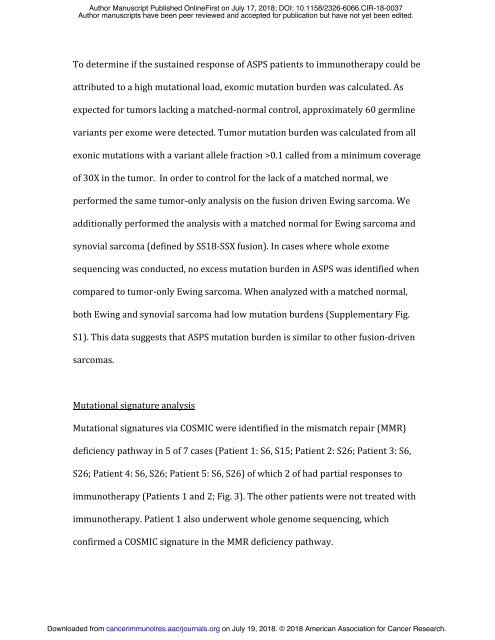Alveolar Soft Part Sarcoma
Create successful ePaper yourself
Turn your PDF publications into a flip-book with our unique Google optimized e-Paper software.
Author Manuscript Published OnlineFirst on July 17, 2018; DOI: 10.1158/2326-6066.CIR-18-0037<br />
Author manuscripts have been peer reviewed and accepted for publication but have not yet been edited.<br />
To determine if the sustained response of ASPS patients to immunotherapy could be<br />
attributed to a high mutational load, exomic mutation burden was calculated. As<br />
expected for tumors lacking a matched-‐‐normal control, approximately 60 germline<br />
variants per exome were detected. Tumor mutation burden was calculated from all<br />
exonic mutations with a variant allele fraction >0.1 called from a minimum coverage<br />
of 30X in the tumor. In order to control for the lack of a matched normal, we<br />
performed the same tumor-‐‐only analysis on the fusion driven Ewing sarcoma. We<br />
additionally performed the analysis with a matched normal for Ewing sarcoma and<br />
synovial sarcoma (defined by SS18-‐‐SSX fusion). In cases where whole exome<br />
sequencing was conducted, no excess mutation burden in ASPS was identified when<br />
compared to tumor-‐‐only Ewing sarcoma. When analyzed with a matched normal,<br />
both Ewing and synovial sarcoma had low mutation burdens (Supplementary Fig.<br />
S1). This data suggests that ASPS mutation burden is similar to other fusion-‐‐driven<br />
sarcomas.<br />
Mutational signature analysis<br />
Mutational signatures via COSMIC were identified in the mismatch repair (MMR)<br />
deficiency pathway in 5 of 7 cases (Patient 1: S6, S15; Patient 2: S26; Patient 3: S6,<br />
S26; Patient 4: S6, S26; Patient 5: S6, S26) of which 2 of had partial responses to<br />
immunotherapy (Patients 1 and 2; Fig. 3). The other patients were not treated with<br />
immunotherapy. Patient 1 also underwent whole genome sequencing, which<br />
confirmed a COSMIC signature in the MMR deficiency pathway.<br />
Downloaded from cancerimmunolres.aacrjournals.org on July 19, 2018. © 2018 American Association for Cancer Research.



